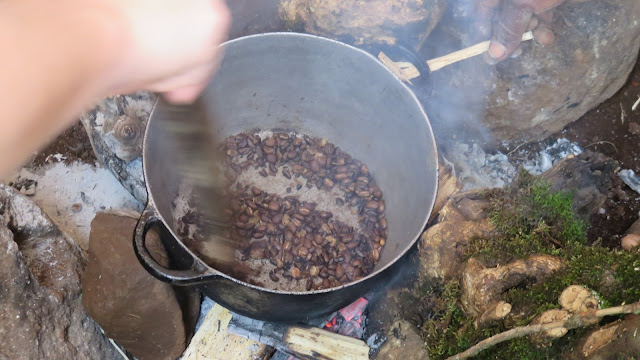Uganda is known for many things, but one of the great things is Arabica coffee. About a year ago Starbucks even got ahold of some of the wonderful coffee grown on the cliffs of Mt. Wanale at Sipi Falls. This is practically my backyard!
Daily my morning starts with delicious Masaba coffee that is grown and roast right here near Mbale. But I never knew how much went into getting my coffee from a fruit on a tree to the deliciousness in my mouth.
I was able to visit a village church with two of my friends. We drove about an hour and through many pot-holed roads until we reached the Pastor's home. We were warmly and joyfully welcomed and led inside to this delicious spread.
 |
| Chappati (like a tortilla but more delicious because it is fried), avocado, and freshly roasted and ground "African" coffee (meaning it is mostly made with milk) |
 |
| Again, I said we were joyously welcomed. Uganda has such a great culture of hospitality! |
After finishing our breakfast, we proceeded next door to the local church to join them for Sunday "prayers". We were seated at the front of the church, as guests of honor. And my friend, Eric, was the guest preacher, but not before many wonderful songs led by the church choir.
 |
| I love that you often see produce or chickens given as an offering in the village.
Just as the sermon was ending, a torrential downpour came.
|
Since the rain didn't seem to be letting up anytime soon and the ladies and children of the church were playing drums, singing praises, and dancing to pass the time, I suggested to my friend, Malinda, that we should join them in the dancing. Everyone went wild to see two mzungus dancing (Mzungu is what I am called on a daily basis- meaning white person). They loved it and many others joined in with us.
Once the rains subsided, church was released and our coffee tour began.
Step 1: Harvest the red beans from the coffee trees
Step 2: Pour the beans into a machine that separates the parchment from the actual coffee bean.
Step 3: Turn the wheel because this is all done locally with manual labor.
The end result is a slimy coffee bean. But this is by far not the end of the process.
Step 4: (not pictured) Soak the slimy coffee beans for 24 hours in a basin of water to allow for the "fermentation" process. This gets off the slimy coat.
Step 5: (not pictured) Lay the new non-slimy beans in the sun (on a tarp) for about three days, unless it is rainy season- then you will need longer for them to dry out.
Step 6: Pound your dry beans to remove an outer "husk" that is on the beans.
Step 7: Winnow the beans to remove the chaff.
Step 8: Time for roasting!! Heat up the saucepan and pour in the ready beans.
Stir constantly while roasting so the beans don't burn.
Almost there. You want it to be a beautiful dark color and
start having the aroma's of your morning brew.
Step 9: Winnow one more time to assure that any chaff that was loosened by roasting is not in your beans.
Mmm... and there it is. Delicious Arabica coffee grown in Uganda. But there is still one more step, the tenth step to make the process complete.
Step 10: Pounding the beans into very fine grounds.
Step 11: Enjoy.
 |
| We actually drank the coffee that we had roasted. It has never tasted so good. |
As we left the village after a wonderful day, we were given some parting gifts.
(Not only are Ugandans extremely hospitable, they are also extremely generous).
 |
| Apple bananas, a hen, and a bag of avocados |
And we drove off from a wonderful day in the village with beautiful brother and sisters in Christ (and more knowledge and appreciation for my daily cup of joe).






















No comments:
Post a Comment